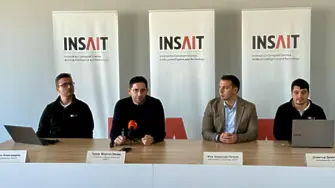Dimitar Vatsov told Darik: Volgin is one of the classics of pro-Russian propaganda, it is scandalous that he leads a show
In his words, Bulgaria is probably the only country in the EU and Europe in general that does not have a national communication strategy
There has been a near doubling of the number of materials spreading disinformation in the country compared to the most active period of 2022, and this is happening by machine - through mushroom sites. In the first quarter of the year alone, 65,437 such materials were identified, or twice as many as in the first three months of 2022, when the war in Ukraine broke out.
It is the war and Russia's position, China's role in it, and other such topics that are the main ones on which artificial narratives are being pushed. This is what the third newsletter of the Foundation for Human and Social Research shows. Dimitar Vatsov, founder of the Foundation and professor at the NBU, told more about the findings of the survey in the "Who's Talking?" program on Darik Radio.
Александър Кашъмов за риска от ограничаване на достъпа до информация за гражданите
"These are about 400 sites, we personally counted 370, but they are a bit more. We work with an automated media monitoring system that in real time archives over 8,000 sources in Bulgarian - websites and blogs, which means that publications cannot be deleted. This allows them to be searched - it gives access to the content of the articles and allows some frequency measurements - how often articles appear that contain the keywords searched. We work with an automated system, but it cannot give us direct access to the machine because it contains about 400 sites. When we grab the content, we then have to manually see the source article by article," explained Dimitar Vatsov.
Кристиан Николов пред съда: Извинявам се от дъното на душата си
He added that there are four main domains, to which subdomains are added and thus several hundred sites are cloned. They are identically designed and have the same content - they look like ordinary news sites, but contain publications that are openly pro-Russian propaganda.
The professor also said that the sources are usually reprints from Russian channels - most often direct propaganda channels. The sources are Russian, the translation is from Russian, usually bad, but they don't mind that because they mainly rely on the momentary impression through seeing only the headline, he said.
„Българите са дошли по пътя на копривата“ и още бисери от тазгодишните матури
"These 400 sites, somebody is machine filling them with content, but they are advertising the same platform all the time. We can't directly prove the link between the sites and the platform, but the platform is saying 'come to us, we'll build you a ready-made site, we'll populate it with content, and you'll share it on social media and through every share you'll make money'." So this machine is used to recruit people behind it to share on social networks all the time," Dimitar Vatsov further explained.
Всичко за 49-ото Народно събрание четете ТУК
Най-интересните разговори от ефира на Дарик слушайте в подкаста на радиото в Soundcloud, Spotify, Apple Podcasts и Google Podcasts













